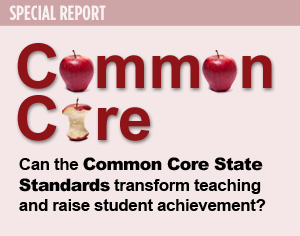Despite intensifying political battles over the new Common Core State Standards in many states this summer, a new poll shows that a majority of Americans have never heard of them. The new math and English standards, developed to increase rigor in classrooms and better prepare students for college, have been adopted by 45 states and the District of Columbia and roll out in many schools this fall. According to this year’s Phi Delta Kappa/ Gallup Poll of the Public’s Attitudes Toward the Public Schools, 62 percent of those polled said they did not know what the Common Core was.
Among the third of those polled who had heard of these new standards, most were only “somewhat knowledgeable” about the standards. Many Americans also incorrectly believe the standards are being created in all subject areas (they are for math and English language arts), that they are a mixture of new standards and previous state standards (the standards are new) or that the federal government is insisting all states adopt them (the federal government has offered incentives for states to introduce more rigorous standards, but has not required them to adopt the Common Core specifically).
The standards have been in the works since 2009, but in the last few months a backlash has grown, mostly fueled by critics who worry the standards represent federal government overreach. Indiana has successfully passed legislation that would reevaluate implementing the Common Core, while a bill has been introduced in the Pennsylvania legislature that calls for repealing the new standards. In Alabama, four bills intending to prohibit the implementation of Common Core have all failed.
The poll results suggest there could be ongoing difficulties for advocates of the Common Core initiative as they face challenges to the standards across the country.
While an overwhelming percentage of the people polled support the teaching of key goals that proponents say are enshrined in the Common Core, such as bolstering critical thinking and communication skills, 56 percent of those who were familiar with the standards believed they would either make education in the United States less globally competitive or have no effect at all.
Bill Bushaw, the director of PDK International, which published the survey, said the misinformation about the Common Core means proponents should double down on their efforts to inform the public about the changes.
“I think it’s particularly important right now for education leaders across the country to mount information campaigns to help Americans understand what the purpose of the standards are and some of the ramifications that they’ll see with their children in the schools,” he said in a talk with reporters before the release of the poll results on Wednesday.
The president of the American Federation of Teachers, Randi Weingarten, a strong backer of the Common Core, was unsurprised by the findings. In a statement, she said most Americans support teaching children critical thinking skills, but suggested that misperceptions about the standards should be blamed on states that have tied the standards to new, more rigorous tests. (Weingarten recently called for a moratorium on high stakes attached to the standards.)
“It’s also no surprise that Americans have very little knowledge or understanding about the Common Core State Standards, as states and districts, aided by the Race to the Top grants, have defined it through the lens of testing,” she said.
Jamie Gass, director for the Center for School Reform at the Pioneer Institute, an independent public policy research organization, is a critic of the Common Core who says the new standards are dumbing down more rigorous ones already in place in some states.
“The Common Core are not very good standards; they’re simply not as good as the standards that were previously in place in Massachusetts, Indiana, and California,” Gass said in an interview. “So I think people have an intuitive sense that this will not really prepare their children well for competition in the 21st century.”
The poll also found that 58 percent of Americans don’t support evaluating teachers based on standardized tests while only 22 percent believe increased testing helps school performance. But according to an Associated Press-NORC Center for Public Affairs Research poll released recently, a majority of parents back standardized assessments for their children. Bushaw said the disparity can be explained by the fact that both polls asked the question differently.




